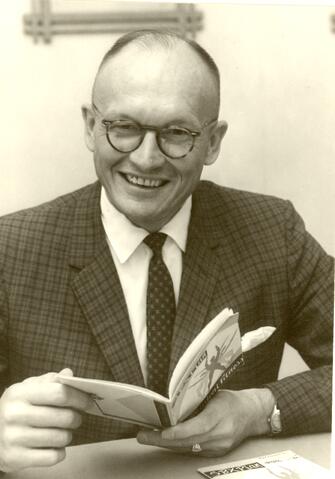
Zone du titre et de la mention de responsabilité
Titre propre
Dr. Bill Orban and 5BX Plan
Dénomination générale des documents
- Document graphique
Titre parallèle
Compléments du titre
Mentions de responsabilité du titre
Notes du titre
Niveau de description
Pièce
Cote
Zone de l'édition
Mention d'édition
Mentions de responsabilité relatives à l'édition
Zone des précisions relatives à la catégorie de documents
Mention d'échelle (cartographique)
Mention de projection (cartographique)
Mention des coordonnées (cartographiques)
Mention d'échelle (architecturale)
Juridiction responsable et dénomination (philatélique)
Zone des dates de production
Date(s)
-
July 1962 (Production)
Zone de description matérielle
Description matérielle
1 photograph. : b&w. ; 17 x 12 cm
Zone de la collection
Titre propre de la collection
Titres parallèles de la collection
Compléments du titre de la collection
Mention de responsabilité relative à la collection
Numérotation à l'intérieur de la collection
Note sur la collection
Zone de la description archivistique
Nom du producteur
Historique de la conservation
Portée et contenu
Dr. Bill Orban, director, School of Physical Education, reads the 5BX plan he created.
Bio/Historical Note: Dr. William Robert Orban was born in 1922 in Regina, Saskatchewan. His parents were immigrants from Hungary. Dr. Orban played many sports at the Jesuit high school he attended. In 1941 he was offered a hockey scholarship to attend the University of California, Berkeley, where he initially studied engineering. Dr. Orban then attended the School of Physical Education at McGill University and graduated in 1949. He went on to complete a PhD in 1953 at the University of Illinois. Dr. Orban took a position at the Department of National Defence and created a fitness programme for Royal Canadian Air Force pilots, a third of whom were not considered fit to fly. In response to this brief he created the 5BX (5 Basic Exercises) plan for men and the XBX (10 Basic Exercise) plan for women. The plans were innovative in two respects. Firstly, they did not require access to specialized equipment. Many Air Force pilots were located in remote bases in northern Canada, with no access to these facilities, so it was important to offer a means of keeping fit without their use. Secondly, the plans only required 11 minutes (for men) or 12 minutes (for women) per day to be spent on the exercises. While studying the effect of exercise at the University of Illinois in the 1950s, Dr. Orban noticed when testing oxygen intake that long periods of exercise did not necessarily lead to significant improvement. This led him to the conclusion that the intensity of exercise was more important, than the amount of time spent on it. This aspect of the plan drew a negative reaction from others in the field but the 5BX programme proved its worth. 23 million copies of the booklets were sold and translated into 13 languages. The popularity of the programs in many countries around the world helped to launch modern fitness culture. Dr. Orban, as a public servant, received no additional income from the success of the plan.
Dr. Orban was himself a superb athlete, active in many sports of which football and hockey were his favourites. He played professional football with the Regina (now Saskatchewan) Roughriders (1941) and later with the Winnipeg Blue Bombers (1945), and was an excellent basketball player and boxer. Dr. Orban was a Junior A hockey player and continued to play hockey right up to age 60 and ran 14 kilometers every day until age 73.
In 1958 Dr. Orban became dean at its new Physical Education program at the University of Saskatchewan. While there he initiated the Saskatchewan Growth Study - a pioneering study of physical development in boys aged 7 to 17. In 1966 Dr. Orban returned to Ottawa to become a professor of the University of Ottawa's Human Kinetics department and became dean of that department in 1968, a position he occupied until 1976. He continued as a professor in Kinanthropology until his retirement in 1987. Dr. Orban died 18 October 2003 in Ottawa.
Zone des notes
État de conservation
Source immédiate d'acquisition
Classement
Langue des documents
Écriture des documents
Localisation des originaux
Disponibilité d'autres formats
Restrictions d'accès
Délais d'utilisation, de reproduction et de publication
Photographer: Unknown
Other terms: Copyright owned by the University Archives.

